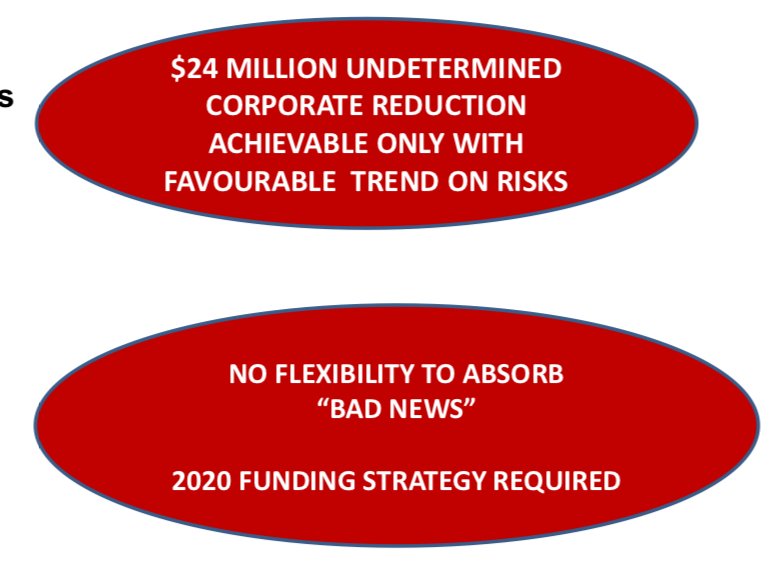City Hall Watcher #3: This city's budget is made of mystery meat
Plus six other stories from the city's annual budget launch — it's the BUDGET LAUNCH SPECTACULAR!
Oh no, it’s your last FREE issue! Become a paying subscriber today.
Follow-up from issue #2: Mayor John Tory’s Executive Committee approved the Housing Now plan, and it will now go to City Council. The TTC board adopted the staff-proposed ten cent fare hike as part of their 2019 budget. The TTC budget is now part of the city’s budget, which launched today.
Mystery meat, and six other stories from the city’s budget launch
City of Toronto staff unveiled their draft 2019 budget this morning. As is always the case with these budgets, the launch involved throwing several hundred pages of information in the general direction of media, councillors and advocates. Digging through all of it will take a bit of time.
But here are seven big budget stories I noticed right away.
1. The budget includes $79 million of mystery meat
The City of Toronto is legally required to produce a balanced operating budget every year. Deficits are absolutely not allowed.
But over the last decade the city has at times — through various types of trickery and clever schemes — found ways to produce balanced budgets that are not technically balanced. (One year the city actually loaned money to itself to make the budget balance.)
This year’s draft budget includes THREE strategies to balance the unbalanced budget.
$24 million in unspecified TTC reductions to be found at some point in 2019
$10 million in savings to be found at or around City Hall somewhere before the budget is set to pass through council in early March
$45 million to come via a request to the federal government to cover costs related to shelters.
That’s $79 million of mystery meat in the city’s 2019 budget casserole. It needs to be there — the casserole won’t be edible without it — but it’s not fully clear what it is. Could be duck. Could be horse, maybe. Oh god. I’ve extended this analogy too far.
I talked about the $24 million the TTC hopes to find last week. It’s a risky gambit, as the TTC highlighted in their budget presentation last Thursday by using ALL CAPS and red bubbles.
The $10 million in City Hall savings to be found in the next few weeks is without recent precedent. In his remarks this morning, new City Manager Chris Murray explained that this would be achieved by making adjustments to the “non-union rank and file” management structure at City Hall, specifically targeting “corporate services” like his own office and the office of the CFO.
It has the whiff of a new boss wanting to make some quick changes to the way things work.
Finally, the $45 million requested of the federal government is not unreasonable. City staff have repeatedly indicated that new refugees have put pressure on the city’s shelter system, increasing costs. But there are two complicating factors for the federal government.
First: if Toronto gets this money it follows that virtually every mid-to-large-size Canadian city with any kind of shelter system will expect similar funds.
And second: odds are very good that this is not a one-time monetary need. Unless the shelter need suddenly reduces over the next year, the city will be looking for at least $45 million next year, and the year after.
2. Land transfer tax revenue is down, but city not lowering forecast
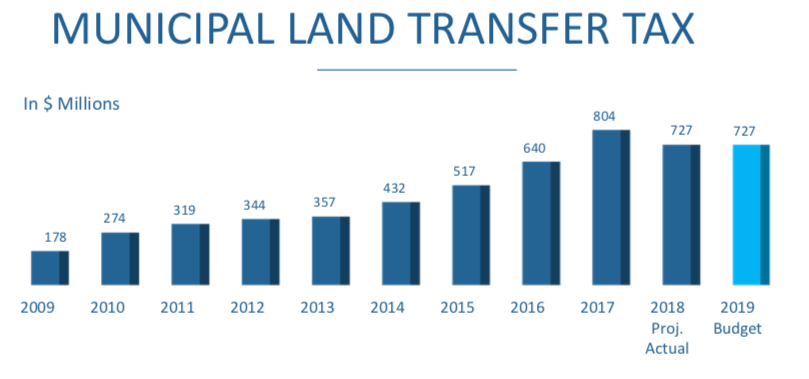
A City of Toronto chart — sorry about the y-axis
We knew this was coming: revenue from the city’s land transfer tax — a tax on real estate transactions — saw a projected decline of $77 million from 2017 to 2018.
That our mystery meat budget figure is about the same as the land transfer tax decline probably isn’t entirely coincidental. If the land transfer tax had held firm at 2017 levels, the city’s budget process this year would be significantly easier.
Despite the decline of land transfer tax revenue last year — the bulk of which, staff say, came in the late summer and fall — the city has decided not to assume a further reduction. Staff are projecting that land transfer tax revenue will hold firm at 2018 levels in 2019.
Is that a good assumption? Well, here’s something to consider: city staff have never conducted any real estate market analysis when budgeting for land transfer tax revenues. All they’ve ever done is go by previous year revenue levels. Why mess with success, right? There’s no way this can go badly, right? Right? Right?
3. Gardiner gets $2 billion in repair funds, as other city infrastructure set to crumble
Here’s a fun game of compare and contrast.
Here’s the City’s State-of-Good-Repair (SOGR) backlog for the next decade. SOGR is the measure of how much the city would need to spend to fix up infrastructure.
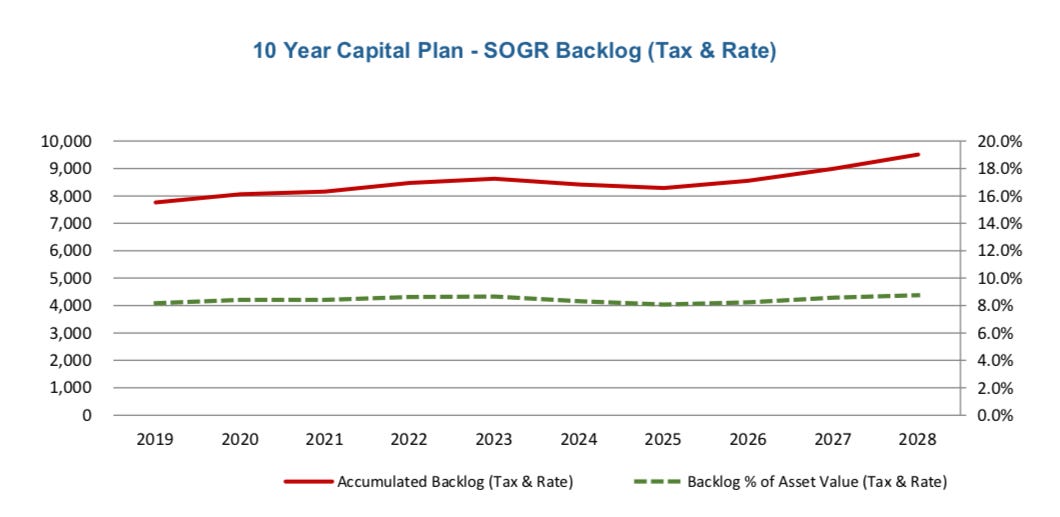
City of Toronto chart — the scale on the left is in millions of dollars
Now here’s the same SOGR backlog, with one thing removed: the $2 billion the city is set to spend on rehabbing the Gardiner Expressway.
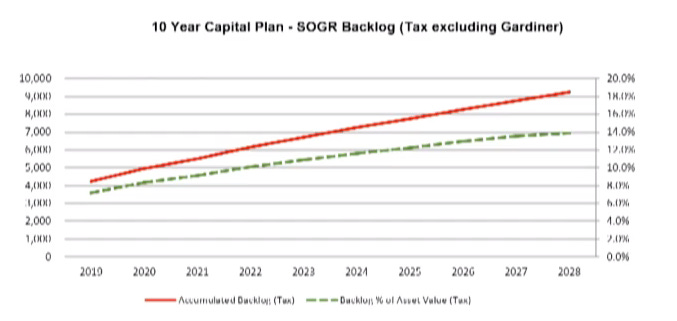
City of Toronto chart - apologies for the blur, this was included in the staff presentation but not in the materials given to media
In the first image, there’s a faintly concerning trend. The backlog of broken and busted infrastructure is increasing a bit, but it feels like the challenge is surmountable. In the second image, the trend is sound-the-alarm, oh-no-everything-is-broken bad.
It gets worse when you dig into the SOGR specifics. Through 2028, the city’s SOGR backlog for TTC is set to increase by $700 million. The repair bill for our parks and rec centres will go up $155 million. Toronto Public Library’s needs will go up by $93 million. And the really, really, ridiculously bad one: the repair backlog at Toronto Community Housing Corporation will go up by $1.4 billion.
It’s no exaggeration: as the city focuses on fixing the Gardiner, almost everything else is set to fall further into disrepair.
4. Lock it down — budget adds security at city facilities
We knew there would be upgrades coming to City Hall security — Toronto Council approved a plan for that last year — but I was surprised to see the budget include $4 million in security upgrades, not just at City Hall but at a variety of other city-owned facilities.
In total, the budget adds 18.6 full-time security positions and $4 million in new security spending for City Hall, Parks & Recreation, Toronto Public Health, city shelters, Toronto Employment & Social Services, the Jack Layton Ferry Terminal and the Union Station Loading Dock & Food Court. Gotta protect that Booster Juice.
Councillor Shelley Carroll, a budget committee member, has already expressed some concern about this new security spending coming at the expense of other programs:
5. Everyone will pay more for their garbage takes
Toronto funds garbage collection through a mixed model. First, there are user fees set based on how much it costs the city to process garbage, based on the size of the bin a household chooses to use: small, medium, large or extra large. Then there are rebates funded through the property tax base, given to all households (except those opting for the extra large bin) that bring down the costs.
Here’s what that model looks like now for single family households. (Condos and apartment buildings are different, but similar.)
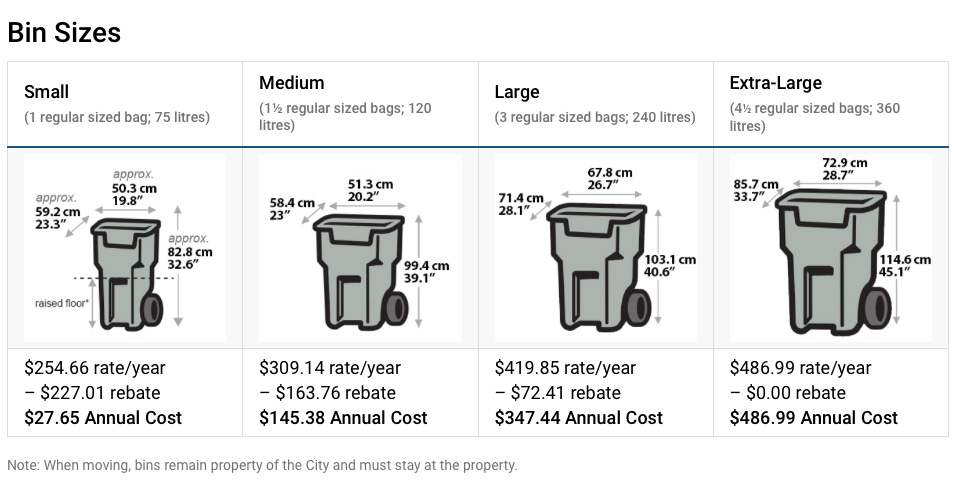
City of Toronto website
Some news today: the rates are set to go up by 2.2% this year.
Some much bigger news today: the rebates for large-size bins are set to go away altogether this year, and all rebates are to be phased out over the next three years.
This means some hefty annual cost increases. For people with small bins, the cost will increase by a factor of ten — from about 28 bucks a year to $288.82.
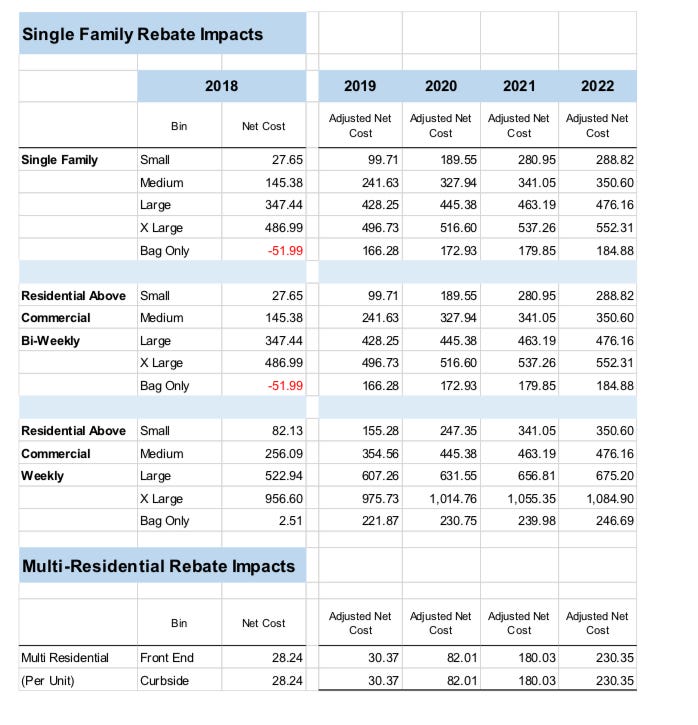
City of Toronto table - draft plan for eliminating garbage bin rebates
There are a couple of ways of looking at this change. From an environmental angle, it makes sense to expose people to the real cost of picking up and hauling away their trash.
But from a pure cost perspective, this change will amount to one of the most significant fee increases ever levied on residents. And it prompts the obvious follow-up question: what’s the city going to spend the savings on?
City staff did announce that there will be a program for low-income residents to get relief on the cost of garbage collection, but staff later clarified the program would only be available to seniors and people living with disabilities, and not all low-income people.
Like everything else announced today, this needs to be approved by councillors before it becomes official.
6. Cutting 50% of council saves nowhere near 50% of council budget
Toronto’s 2018 operating budget for City Council with 44 councillors: $23.417 million
Toronto’s proposed 2019 operating budget for City Council with 25 councillors: $22.163 million
Net city operating budget savings achieved by cancelling elections in progress, inspiring midnight protests where people literally kicked the hell out of Queen’s Park and also multiple court challenges that led to a premier threatening to override the Canadian constitution: $1.254 million
You could almost buy a detached house in Toronto for that much.
7. New Boss, New Budget
This was the first budget launch overseen by Chris Murray, the new City Manager. Some notable style changes.
First, unlike the past couple of years, staff did not provide a list of council-approved programs that were not included in this draft budget.
When Councillor Mike Layton asked about the omission, staff said there were not many unfunded programs, and a list could come later. Eagle-eyed Toronto Star reporter Ben Spurr has already noticed one glaring thing missing — full phase two implementation of the city’s transit pass for low-income people is being pushed back.
The other big change was a lesser emphasis on the property tax rates for the year. In the past, staff have taken more time to explain how they arrived at their property tax figure, getting into assessment growth and other technicalities.
This initial budget presentation offered none of that. Instead, staff just noted that residential property tax revenue is set to go up 2.55%, which is about in line with inflation, and that overall property tax revenue across all classes — residential, commercial, industrial — will go up by 1.8%, which is below inflation.
What happens next
The city has now posted “analyst notes” for every city department. They are detailed individual budgets. When I muster the courage and the fortitude, I will begin reading them. All of them. More details to come.
The city’s budget committee will continue holding meetings. The next one is Monday, February 4.
All budget materials will be posted by the hardworking and studious city clerk’s office at toronto.ca/budget.
The Week Ahead
MONDAY: The budget launched. We celebrated. I kept saying “Mystery Meat Budget.” I’m hoping it catches on.
TUESDAY: The Sign Variance Committee meets to discuss signs. The Toronto Parking Authority meets to consider a report on who among us should get free parking passes — the report wasn’t available as of press time.
WEDNESDAY: City Council meets for their first meeting of 2019. On the agenda: the Richmond-Adelaide bike lanes (discussed in CHW #1), the Housing Now plan and — in my sleeper pick for agenda item that generates a surprising amount of debate — a motion by Councillor Paula Fletcher to ensure that the cut to the size of city council does not lead to fewer Community Environment Days.
THURSDAY: Day two of City Council’s meeting. More items will be discussed. Another notable one: newbie Councillor Brad Bradford wants a report on implementing term limits.
FRIDAY: A day of free City Hall meetings, unless City Council goes overtime. If they don’t, spend it reading Analyst Notes. Or at the pub. Or reading Analyst Notes at the pub.
City Hall Watcher
Thanks for reading and presumably enjoying this special CITY BUDGET LAUNCH edition of City Hall Watcher. Like Christmas, this only happens once a year. That’s where the similarities end, though.
This is the third and final free issue of City Hall Watcher. To keep subscribing, go to graphicmatt.substack.com and enter your payment details.
It’s five bucks a month or fifty dollars a year — a bargain and a deal.
Become a paying subscriber today.
If I haven’t earned your subscription money yet, I understand. Please stay subscribed to this list — I’ll make occasional future issues free so you can check in and see if things have gotten any better.
Now available: FREE subscriptions for students, aspiring city hall watchers and others who cannot afford the subscription price. Just fill out this form to submit a request. I’ll process these before next week’s edition.
Request a free subscription here: https://goo.gl/forms/3pXHZoULaEEfNlCc2
As always, send questions, tips, feedback to graphicmatt@gmail.com.
Thank you for reading City Hall Watcher.



